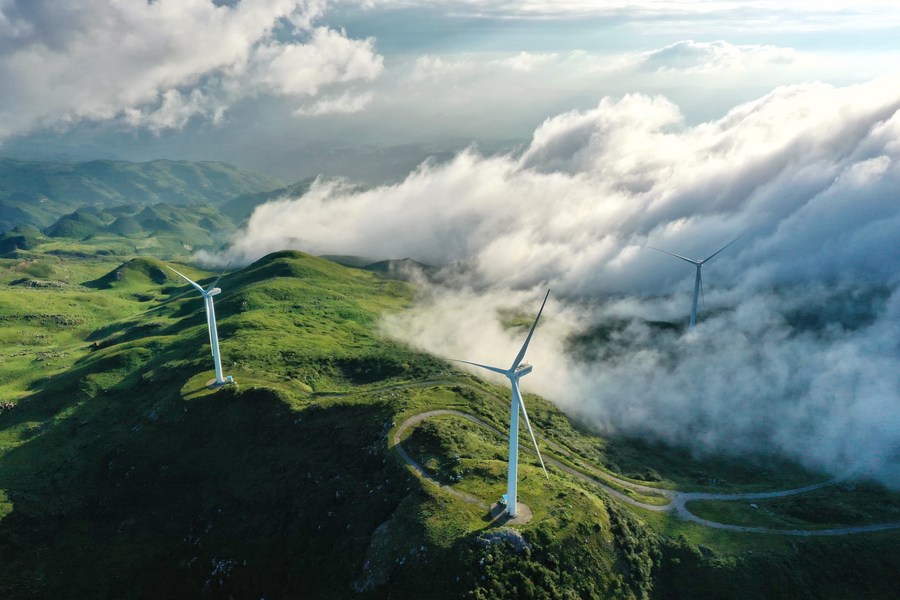China's resolve to cut carbon emission welcomed by experts, entrepreneurs

Aerial photo taken on Aug. 19, 2020 shows wind turbines in Jiucaiping scenic spot in southwest China's Guizhou Province. (Xinhua/Liu Xu)
BEIJING, March 21 (Xinhua) -- Economists and business leaders attending the ongoing China Development Forum 2021 spoke highly of the country's resolve to prioritize the reduction of carbon dioxide emissions in future development.
Focusing on China's commitment to peaking carbon dioxide emissions by 2030 and achieving carbon neutrality by 2060, the participants of the economic summit of the forum discussed the opportunities and successful experiences in the field.
China's plan of being carbon-neutral by 2060 on the will to have an early peaking of carbon emissions was probably "one of the greatest news of 2020 in the fight against climate change," said Jean-Pascal Tricoire, chairman and CEO of Schneider Electric.
The company is willing to work with Chinese partners in improving the efficiency of industrial facilities and reducing energy consumption and emissions with the help of digitization, he said.
Believing China will achieve early carbon peaking, Nicholas Stern, professor at the London School of Economics and Political Science, suggested the country take a string of measures such as stopping investing in the coal industry, developing new energy sources, using recyclable energy and making improvements in transport and land.
Mark Cutifani, CEO of Anglo American plc, said his company would like to work with China in reducing car emissions by providing metals needed for the production of electric vehicle batteries while offering ecologically-friendly chemical fertilizer to reduce pollution and emissions in China's agricultural sector.
China's endeavor in green development has already set sail with progress achieved in business and society to develop green and sustainably.
The country has made progress against the threat of climate change, said Kevin Sneader, global managing partner of McKinsey & Company, noting that China has accounted for almost one third of the total global investment in renewable energy in 2018 and is home to more than 95 percent of the world's electric bus fleet, as well as nearly half of all-electric passenger vehicles.
The number of paper published by China in the field of green and sustainable science and technology is more than doubled since 2016, reaching a total of 30,000 in the last decade, he added.
Pioneering actions have also been taken by both domestic and foreign enterprises to promote low-carbon business development in the country. For example, China's private textile and aluminum giant Shandong Weiqiao Pioneering Group Company Limited has increased the usage of hydro and solar power in production to reduce coal consumption and invested in the recycling of aluminum, cars and home appliances.
Carlos Brito, Global CEO of world-leading brewer AB InBev, revealed that in 2020, the company's brewery in southwest China's Sichuan Province became the first brewery in the country to be 100 percent powered by renewable electricity, which is joined by two more breweries in other parts of the country this year.
"We believe that we have a part to play to support China to achieve its carbon-neutral goals and to promote green and high-quality development through innovation," he said.
Shu Yinbiao, chairman of China Huaneng Group, one of the major state-owned power companies in the country, said he expects China's non-fossil fuel consumption to account for up to 83 percent of the total as of 2060, while electricity consumption would account for 70 percent.
China has made efforts to ramp up green development with market-oriented policy incentives, such as setting up national funds to support key projects and areas and encouraging financial institutions to offer green loans to low-carbon projects with preferential interest rates.
Carbon neutrality will give birth to many new economic growth engines, prompting high-quality employment, innovation opportunities and economic competitiveness, as well as other benefits in economic and social development, said Zhang Lei, founder and CEO of Hillhouse Capital.
"It is high time to invest in green equities," Zhang told the forum.
As a leader in green finance, China has developed multi-level products and formed a multi-layered market system in the field, Jack Chan, chairman of EY China, told Xinhua in an interview at the sideline of the forum.
The standards of China's green finance products are more and more consistent with international standards, he said, expecting the country's standardization of products and transparency of information to attract more domestic and foreign investors into the green industry.
Photos
Related Stories
- China's new five-year blueprint paves way for 2060 carbon-neutrality
- China's resolute pursuit of reducing carbon emissions
- China completes 2020 carbon emission target early
- Trading of certified carbon emission reductions benefits villages in S China’s Guangdong
- Study says China may hit carbon emissions goal early
- China’s carbon market to play vital role in emission reduction in 2020
- China yet to reach carbon emissions peak, working to ease growth
- China makes progress in fulfilling commitment on carbon emissions
- China urges consensus on new climate change pact
- China's carbon emission down by 5 percent: Premier Li
Copyright © 2021 People's Daily Online. All Rights Reserved.










